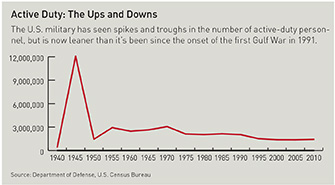
Rothbrust, a retired Army colonel, told the story of a chance meting with one of his crane operators. As they got to talking over a cup of coffee, they realized that
they had worked in the same military installation in different units 200 feet apart from each other in 1977. As was apparent, the range of skills military personnel learn runs the gamut.
Skill Sets
Jerry Jorgensen wondered what skill sets veterans brought to the marketplace and whether human resources people understood the advantage of hiring them.
“When I think of a departing veteran,” said Dean Vakas, “I think of maturity.” Vakas defined maturity as having developed seasoned judgment, common sense, reasoned decision making, and a talent for team building. As he explained, veterans will have learned both to lead and to follow: “These are two very important things that veterans bring to the work force.”
Mike Denning, the director of graduate military programs at the University of Kansas and a retired Marine Corps colonel, cited “cultural awareness” as a useful skill, especially given the amount of time military members spend overseas and the variety of positions they hold. A related asset is their exposure to a diverse work force. “From an HR perspective,” said Denning, I know that this is something that is widely respected.”
Another asset that veterans bring to the table, said Mike Hockley, was the ability to “adapt to a situation and make decisions under pressure.” As a JAG officer, Hockley had only tried criminal cases, but his experience helped him to quickly adapt to his civilian specialty in environmental law. “Within six months after joining our firm,” said Hockley, “I was handling the same kinds of cases that fifth- and six-year partners were handling.”
One useful new program the Army was launching, said Brett Rosene, has been designed to convert military skills into certifiable civilian skills. The program is called the Soldier Life Cycle. The way it works is that if a member of the military is a heavy equipment operator, that person would actually get the civilian equivalent credential for the particular equipment. The same holds true for truck driving, nursing, and other specialty fields. This way, when a person leaves the military, he or she leaves with civilian credentials in hand.
Rosene’s operation focuses on 18-to-26-year-olds who may be able to drive a tank but may not have a specific skill readily transferrable to civilian life. This is the group most at risk of failing to adjust, he noted. Through this program, military people are given opportunities to build on their skill sets throughout their service instead of packing in all the transitional skills at the end. They can enter the program two years before they expect to leave the service. “This is new,” said Rosene. “The Army is the one that’s taken the lead with this.”
Florian Rothbrust added that at some military installations, unions and private industries begin working with military personnel six months before they leave the service so that the day they get out of the military, they are “sitting on a union bench getting ready to take a job.”
Among the sectors that have been hiring veterans, said Bob Ulin, are transportation, rail and trucking. Many veterans come to the job with security clearances and drug-free backgrounds. They also come with the kind of organizational and planning skills that companies in those areas value.
Erik Bergrud, associate vice-president of constituent engagement at Park University, referred to the book Startup Nation. The book addresses the question of how the nation of Israel, with 7 million people and the threat of war never far from mind, managed to become an entrepreneurial powerhouse.
According to Bergrud, Israeli military veterans actually built this economy through their networking and analytical skills. Thanks to the Kauffman Foundation and the Chamber of Commerce’s entrepreneurial focus, Bergrud sees the potential here for veterans to do something like their Israeli counterparts did.
Drawdown
The military uses the term “drawdown” to signify a reduction in the size or presence of a military force, and after lengthy engagements in Iraq and Afghanistan, the military is going through a drawdown right now. Jerry Jorgensen asked whether this current drawdown would lead to a period of high productivity thanks to the infusion of human capital, or simply a flooded marketplace with high unemployment and depressed wages.
Florian Rothbrust believes that the answer to the question depends on whether the private sector can be educated to understand what they are getting from military veterans. They will be hiring people, said Rothbrust, who have self-discipline and a great work ethic.